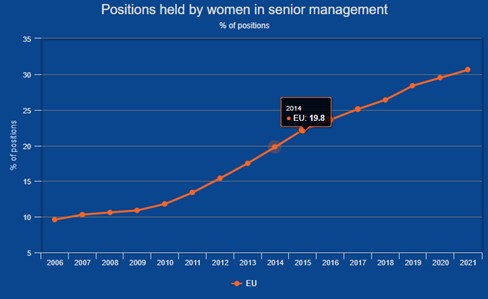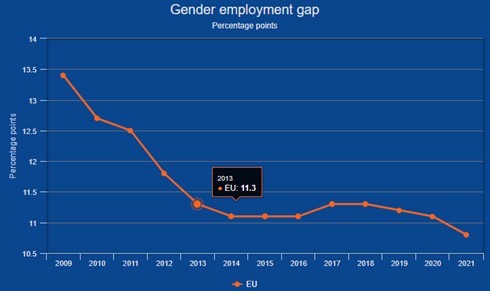Why diversity and attracting talent matters for the fire and security industry
This year Euralarm started a new initiative focusing on diversity and attracting new talent. The importance of the initiative is underlined by the rapid engineer retention and the lack of competent and qualified engineers. This article details the Euralarm initiative and reviews several activities undertaken by Euralarm and its members.
Long and rich history
The fire and security industries are industries with a long and rich history. The origins of the fire industry could be traced back to Nero, the Roman emperor who directed that the city should be rebuilt using passive fire prevention methods and non-combustible materials after a catastrophic fire destroyed nearly half of the city. And as far as the security industry is concerned one could state that the history is almost as old as the fire safety industry with emperors, kings and the like hiring private security guards to protect their families and property.
Major changes in the industry always occurred with the advent of new technology. The invention of electricity, the rise of the computer and further digitization: they all had a big impact on the fire and security industry. And when we focus on the past 50 years, it is clear that the industry has continued to accelerate.
Positive shift necessary
What has not really changed over the past 50 years, however, is the composition of the workforce. The industry is still recognised as a male-dominated field although in recent years there has been a positive shift in the number of women working in the industry. A necessary shift because companies are more and more seeking approachable, friendly and well-presented officers, with advanced conflict resolution skills, as well as an increasing number of talented women across different functions, including science and engineering. With this change, the industry is diversifying, and the need for women officers is growing.

European agenda
Over the years, gender equality has moved up the political agendas of the EU and of many other countries around the world. It is prioritised as Goal 5 of the United Nations’ Sustainable Development Goals (UN SDGs). In the EU, progress has been made in terms of gender balance in decision making, although improvements have been slower in areas related to the labour market.
At European level, the number of women Doctoral graduates, for instance has continued to grow gradually over recent years. However, horizontal gender segregation persists in certain fields of education, with women Doctoral graduates in the EU still over-represented in the field of Education and under-represented in the broad fields of ICT and Engineering, Manufacturing & Construction, and several narrow fields of Science, Technology, Engineering and Mathematics.

Attracting young talent
With the baby boomers approaching their retirement date and the aging of the industry becoming more and more apparent, it becomes increasingly important that the European youth is attracted to our industry to build a more inclusive, diversified, greener and digital future. And with 2022 being the Year of the Youth, things seem to fall in place.
Year of the Youth
The European Year of Youth pursued four objectives:
- Renewing the positive perspectives for young people, with a particular focus on the negative effects the COVID-19 pandemic had on them, while highlighting how the green and digital transitions and other Union policies offer opportunities for young people and for the society at large;
- Supporting young people, including through youth work, especially young people with fewer opportunities, from disadvantaged and diverse backgrounds or belonging to vulnerable and marginalised groups, to acquire relevant knowledge and competences and thus become active and engaged citizens, inspired by a European sense of belonging;
- Supporting young people to acquire a better understanding of, and actively promoting the various opportunities available to them, be it from the EU, national, regional or local level, to support their personal, social, economic and professional development;
- Mainstreaming youth policy across all relevant Union policy fields in line with the EU Youth Strategy 2019 – 2027 to encourage that a youth perspective is brought into policy-making at all levels.
More information on the EU’s initiative can be found here.
Crucial for the industry
When asked why attracting talent is crucial for our industry, David Scott, Managing Director of Skills for Security answers: “As the industry continues to grow and technology develops, attracting new talent into the sector is key to sustainability and improving the quality of working standards. The UK and Europe have struggled of late with engineer retention, lack of competent and qualified engineers and attracting talent where “unattractive” work is the norm, for example, travel, outside work etc. Of late, there has been a shift in the sector where more and more installers are seeing the benefit of growing their own talent as a model that will provide sustainability for both the sector and their businesses. Over the last three years, we have seen the level of apprentice recruitment in the sector more than quadruple. This is the industry responding to the inevitable skills crisis where there is a reported shortage of around 30,000 engineers needed across the UK. With current levels of recruited apprentices,
it will take over 25 years to resolve that skills shortage. We need to recruit and attract ten times the current level of recruited apprentices to resolve the crisis in as little as three years.”
On the importance of attracting new talent, Chief Technical Officer Cristina Rivas Saiz of Euralarm industry member and leader in monitored security Verisure adds: “For us to remain at the cutting-edge of our industry, we must have diversity of thought, perspective and culture. That enables us to continue to deliver the next step-change technology to protect our customers even more effectively. At Verisure, we have a wide range of programs and campaigns centrally and across our countries that support diversity in technology and engineering. For example, our International Graduate Tech Programs help recent graduates in technology live an exciting first work experience, working in different technology teams at our offices. In one of our key locations, Sweden, we are participating in the initiative “Pink Programming” - a volunteer-driven organisation dedicated to inspiring women, transgender and nonbinary people to work in technology. Further, our team in the UK is proud to support the Technicians: We Make the Difference campaign from the Gatsby Charitable Foundation in partnership with the world-famous Science Museum in London. This fantastic initiative, aimed at inspiring children aged 11-16, shows the crucial and exciting roles technicians play across society and the different paths available to becoming one.
We are committed to continuing and extending these programs so that we can inspire even more people to work in technology – irrespective of their age or gender.”
A lot to offer
“Attracting young people and young talent is an absolute necessity for our industry”, says Patrick Van Liempt, Secretary General of the Belgian security association ALIA Security. “In Belgium we are trying to attract new talent for the security industry because of the shortage of personnel and the rapidly developing market. “Although many people still think that security is part of the electrical installation, our industry no longer needs only electrical engineers. In fact, we are increasingly looking for other types of personnel as our systems are increasingly integrated with IT systems. Our business remains a business that requires special skills and knowledge, of course. But it's not just electrical engineers who have those skills and knowledge anymore. Nowadays, our systems are often installed in two steps: first the cabling and installation of components and then the connecting, centralisation, integration and putting the system into service. And after that and most important, security systems need to be maintained and serviced. Therefore, we need people with a technical background and IT knowledge. Diversity and inclusion is the perfect foundation for finding the people that our industry needs. And we have a lot to offer: the latest technology, high-end applications, a lot of variety in the job and above all: interesting social contact.
Turn initiatives into action
There are already many amazing initiatives across the sector that focus on the industry’s diversity and inclusion. Initiatives like WorldSkills is just one example of that. “However, the approach is fragmented and not driven by a central body or resource and therefore, the positivity is quite often not shared widely enough”, according to David Scott. “For example, Skills for Security run both electronic security systems and automatic fire detection and alarm systems while WorldSkills UK competition aims to shine a positive light on the sector and promote it to school children across the UK as a career of choice. But what children want when leaving school is a guaranteed career, with good pay and strong career progression. Therefore, we really need to join forces with those with job availability and school children making career choices so that those attending the event are able to secure full-time employment in what is an amazing sector. Those that choose a career in this sector are often amazed at the diversity and skill set that is developed. I believe that being able to share the diversity of the sector more widely will attract much more diverse talent to the sector.”



